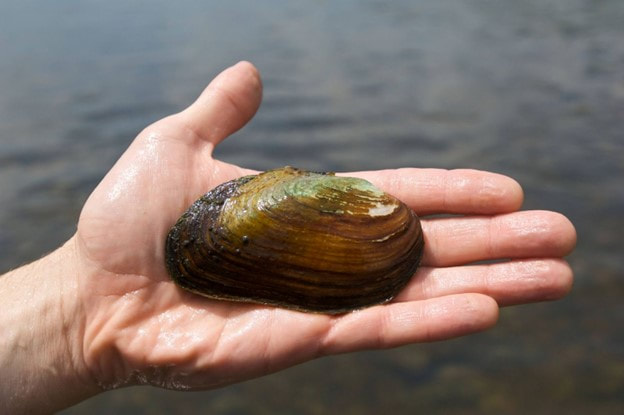|
"Critter Corner" is planned to be a quarterly column that highlights different species or species groups in and around Brewster ponds. Here is the first article by Ron Essig, BPC Board member and Citizen Science Team Coordinator. The first critters being featured in this new column are freshwater mussels - a group of at least six species. The most common is the Eastern Elliptio seen in the photograph below that inhabit shallow water and can be washed onto the shore after strong winds and storms. The least common are the Eastern Pondmussel and the Tidewater Mucket that are state listed species of concern. Other species that might be in Brewster ponds are the Alewife Floater, the Eastern Floater, and the Eastern Lampmussel. Freshwater mussels have an amazing life cycle including a parasitic stage in fish. In the spring, their fertilized eggs develop within the mussel into larvae called glochidia that are released into the water in the summer. The glochidia attach to the gills of host fish where they grow into juvenile mussels within a few weeks. Then they slough off and live on their own in the pond substrate while becoming adults. Some freshwater mussels need particular fish species as hosts, while others like the Eastern Elliptio are considered generalists. This species has been documented to successfully use as hosts Yellow Perch, Pumpkinseed, Bluegill and Banded Killifish that are all residents of most Brewster ponds. Freshwater mussels also play a unique role in pond ecology as filter feeders. Their feeding on microscopic algae and bacteria can remove excess nutrients and improve the habitat for other organisms. They can show large changes in abundance due to changes in food availability. For example, surveys in Walkers Pond in 2013 showed freshwater mussels to be scarce when phytoplankton levels were relatively low. However, their numbers increased considerably in 2022 surveys when phytoplankton levels were high. This change was beneficial to their predators like River Otters and Muskrats. About 75 percent of North America’s almost 300 freshwater mussel species are endangered, threatened or of special concern at federal or state levels. So, we are fortunate to have these unique species in Brewster ponds. You can help protect them by tossing them back into the water if you find them alive on the shore and by taking the steps advocated by BPC to keep ponds clean. Eastern Elliptio. Photo courtesy of US Fish and Wildlife Service, NCTC Image Library.
Comments are closed.
|
Categories |
|
|


 RSS Feed
RSS Feed
